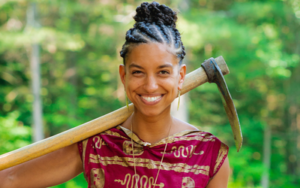As a kid growing up, I have very fond memories of my upbringing in South Carolina.
I remember going to the peach orchard with my grandmother and the rest  of my family.
of my family.
I would climb the peach tree and grab the juiciest, ripest peach I could find.
I loved peaches but one thing I didn’t love, was the fuzz peaches produced and the itching it would lead to.
When I got older, my grandmother had a garden located on a lot beside her apartment
I would spend time in the garden watching things grow and helping her tend to vegetables and other things she planted.
Then it all changed.
I got older and the joy of picking peaches and playing in the garden stopped.
I will always cherish those memories and I know they helped me remember my ancestry and connect with my family.
Why the stroll down memory lane?
Leah Penniman visited Perfectly Healthy and Toned Radio to chat about her book, “Farming While Black”.
Leah details her obstacles of starting a farm as a black woman and her mission to feed and inform the African American community.
We talk about a plethora of things including why African Americans are now disconnected from the land they once revered in the past. Episode # 172 is an instant classic!
Who is Leah Penniman?
Leah Penniman was raised in Massachusetts and began farming as a teenager when she worked with The Food Project in Boston.
She holds an MA in Science Education and BA in Environmental Science and International Development from Clark University.
She has been farming since 1996 and teaching since 2002.
Inside The Episode
I really wanted to do an episode on farming. I was scanning online and Leah’s book appeared. I knew I had to have her own because the book was amazing and it took me back to my roots of growing up in South Carolina.
What You’ll Learn
- How has the restriction from owning land in the past affected African Americans?
- Where did crop rotation and other farming techniques originate?
- Why is the earth living?
- How were seeds transported from Africa to the United States long ago?
- What are some of the obstacles for people of color starting farms?